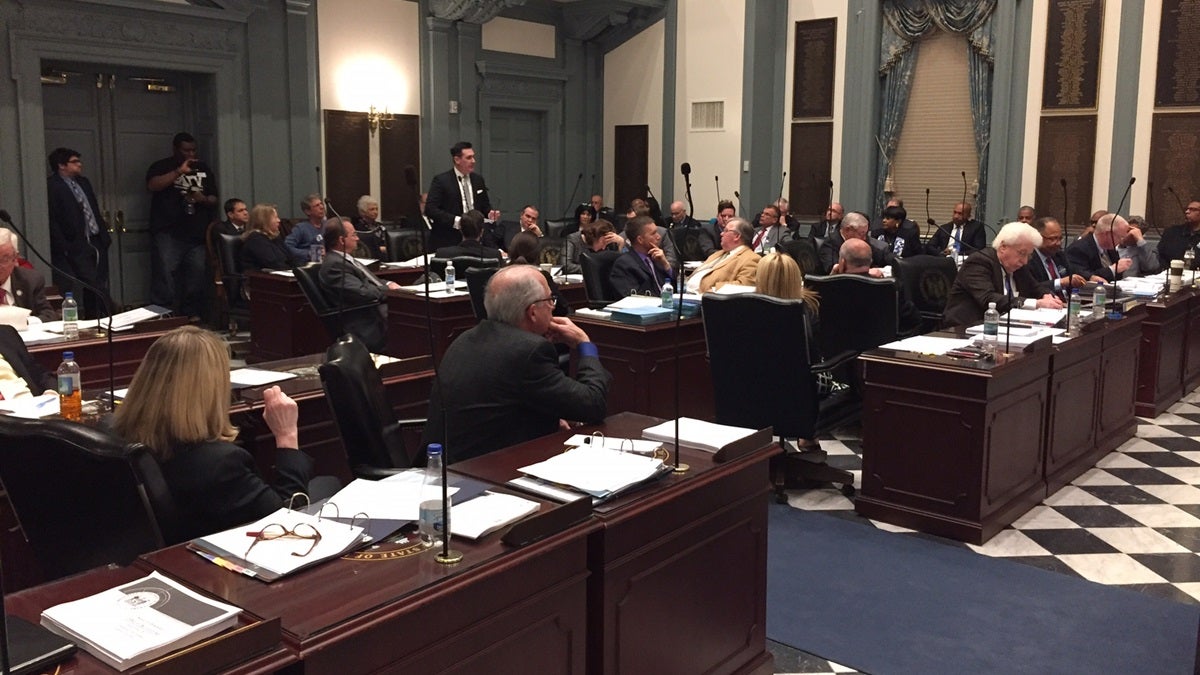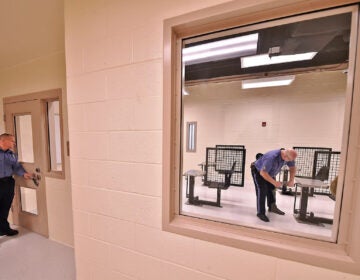Death penalty repeal defeated in Delaware [video]

State Rep. Sean Lynn, D- Dover West, speaks in favor of repealing Delaware's death penalty. (Zoe Read/WHYY)
The Delaware House voted down a bill Thursday that would have abolished the death penalty in the state.
Senate Bill 40, sponsored by Sen. Karen Peterson, D-Stanton, and Rep. Sean Lynn, D-Dover, failed by a 16-23 vote.
“I was disappointed by the decision today, but I remain hopeful,” Lynn said. “This is going to happen. Twenty states have already repealed the death penalty. It’s unfortunate we won’t be the first state to repeal in 2016, but it’s going to happen either by the courts or by the legislature.”
If passed, the legislation would have repealed Delaware’s statute allowing for capital punishment in first-degree murder cases, with an exemption for inmates currently on death row.
The bill was heard in the House Judiciary Committee last spring, but failed to secure enough votes to be released to the full House.
Rep. Larry Mitchell, D-Elsmere, who voted against releasing the bill last year, recently signed SB 40 out of committee with an “unfavorable” endorsement, allowing the bill to move forward.
Those in favor of the repeal say the justice system puts minority and poor offenders at a disadvantage, and cite the frequency of innocent defenders put on death row and the morality issue of killing anyone.
“I oppose the death penalty because I believe the system is broken beyond repair,” Lynn said.
“The worst of the worst aren’t getting the death penalty, because they have better lawyers. Poorer defendants are the ones who get the death penalty—people of color, [people from] poor communities and those with mental illness.”
In the past two years, four men in Delaware have been exonerated from death row. In the nation, 156 individuals have been exonerated, according to the NAACP’s Legal Defense and Education Fund.
“It wasn’t because someone intentionally did something wrong, it’s the way the system is set up,” said Bryan Stevenson, an attorney who testified before the vote. “The error rate is shockingly high.”
Many of the representatives who voted in favor of the legislation cited those statistics as the reason for their vote.
“When you think about death, there’s no turning back. Death is final,” said Rep. Charles Potter, D-Wilmington. “There’s a chance if a person is put in jail for life, that person is serving time, and if you made an error, they’re alive—they get a chance to live their life.”
In addition, 42 percent of death row inmates are African Americans in the nation. In Delaware, African American defendants who have allegedly killed white victims are six times more likely to be sentenced to death than African Americans accused of killing African Americans.
“I don’t think there’s any question our justice system has not worked very well for people of color,” said Stevenson, who defends individuals on death row.
He added that statistics show the death penalty doesn’t deter homicides.
“We have states that have not had the death penalty in a long time, and in those states the decline in the homicide rate has been greater than states that do have the death penalty,” Stevenson said.
“(Criminals aren’t) thinking of what the punishment is when they commit these crimes. We’re not going to deter crime by threatening them with death.”
Several other representatives said voting for the death penalty repeal is the moral act to take.
“When I stop to think of this issue of the death penalty I ask myself, ‘If we morally believe killing is wrong, how can it be moral to then kill somebody for killing another person?” said Melanie George Smith, D-Bear/Newark.
However, those against the legislation said they felt the death penalty provides closure for victims’ families and prevents crime.
Mary Cairns described the gruesome death of Lindsey Bonistall, a University of Delaware student who was murdered in 2005. Cairns said she’s a friend of the Bonistall family.
“Words can’t describe the overwhelming pain and grief Lindsey’s parents have felt since her horrific death,” she said. “Her killer deserves the death penalty for his heinous crime.”
Lt. Tom Bracken, president of the Trooper’s Association, said he’s pleased the legislation was voted down, and believes the majority of Delawareans feel the death penalty in the state is fair.
“It truly is at times a deterrent. I don’t think there’s any way to quantify how many people did not commit an act of violence because maybe at the last minute they did consider, ‘If I do this I’m at danger of facing the ultimate penalty,’” he said.
“I don’t think justice for [the Bonistall] family would be to put a person in jail for the rest of their lives. I think true justice is—for people like that, the worst of the worst—that this punishment is just. “
Meanwhile, individuals like Rev. Donald Morton, executive director of the Complexities of Color Coalition, were disappointed by the vote.
“We elect legislators to do a job to represent the people, and today I believe they failed egregiously at representing the people,” he said.
Morton said he will continue to put pressure on legislators to do what he believes is right for Delawareans.
“When legislators don’t do the job we think we should do, and when they don’t serve a particular constituency represented of poor people, black and brown people, we need to develop candidates that will campaign and that will do the job they are not doing,” he said.
Lynn said he could reintroduce the bill as early as March to aim for a favorable vote. He said Rep. Kimberly Williams, D-Stanton, voted no as a strategic measure so the legislation can be brought back on a motion to reconsider when Rep. Andria Bennett, D-Dover, returns from her surgical leave.
Lynn said he hopes legislators will have the opportunity to be on the “right side of history” before Delaware’s Supreme Court rules capital punishment unconstitutional.
“We’re close. I think this is going to be an evolving dialogue,” he said. “We have gotten this further than any other General Assembly.”
WHYY is your source for fact-based, in-depth journalism and information. As a nonprofit organization, we rely on financial support from readers like you. Please give today.





